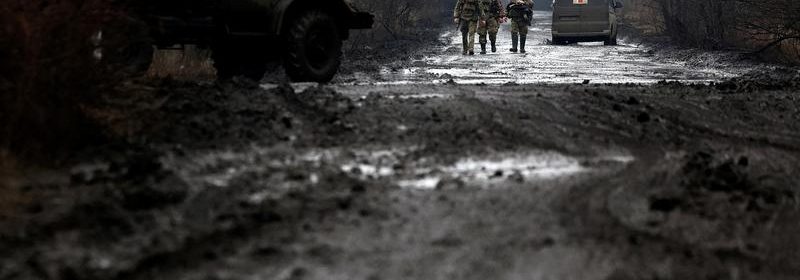Ukraine scorns Russian missile strikes on civilians, defence of Bakhmut holds

KYIV, Ukraine (Reuters) – Russia’s first missile blitz on Ukrainian cities in weeks was met with defiance and disgust over the targeting of civilians, while Ukrainian forces defending the eastern town of Bakhmut continued to thwart Russian attempts to break through.
The pre-dawn barrage on Thursday killed at least nine civilians and cut electricity supplies in several cities, but there was relief that the risk of a catastrophic meltdown at the Zaporizhzhia nuclear plant was averted as power was restored after a temporary disconnection from the Ukrainian grid.
Ukraine said its air defences shot down many drones and missiles during the wave of attacks, but said the Russian forces also fired six Kinzhal hypersonic cruise missiles, which they have no way to stop.
Moscow confirmed it had used hypersonic Kinzhal – Russian for dagger – missiles in Thursday’s attack.
The mass strikes on targets far from the front were the first such wave since mid-February, breaking a lull in the air campaign against Ukraine’s civil infrastructure that Russia launched five months ago.
“The occupiers can only terrorise civilians. That’s all they can do,” said Ukrainian President Volodymyr Zelenskiy. “But it won’t help them. They won’t avoid responsibility for everything they have done.”
Russia has repeatedly denied targeting civilians. Its defence ministry said it had carried out a “massive retaliatory strike” as payback for a cross-border raid last week, and claimed to have hit all its intended targets, destroying drone bases, disrupting railways and damaging facilities that make and repair arms.
The missiles killed villagers in the western Lviv region, and closer to the frontline in the central Dnipro region, while Russian artillery also killed at least three people in the northeastern city of Kharkiv.
Moscow says such hits are intended to reduce Ukraine’s ability to fight. Kyiv says the air strikes have no military purpose and aim to harm and intimidate civilians, a war crime.
In Kyiv, a woman stood outside her shattered apartment, holding a toddler in her arms while venting her anger with Russia in the aftermath of the attack.
“How can they do this? How is this possible? They are not humans,” said Liudmyla, 58, after a night in which the air sirens sounded for seven hours.
Ukrainian military analyst Oleh Zhdanov said that the failure of Russian intelligence to identify military targets and led to a “Plan B – demoralising the population”.
“That is why they hit energy infrastructure, the weakest point, electricity, heating, water,” Zhdanov said in a YouTube presentation.
“And they seem unable to change their strategy with the notion that – whether they make hits or not – sooner or later the people will say ‘enough, we give up.’ But that won’t happen.”
HYPERSONIC MISSILES
The White House said that the barrage was “devastating” to see and Washington would continue to provide Ukraine with air defence capabilities.
But, Russia is believed to have a few dozen Kinzhals, which fly many times faster than the speed of sound and are built to carry nuclear warheads with a range of more than 2,000 km (1,200 miles). In his speeches, President Vladimir Putin regularly touts the Kinzhal as a weapon for which the transatlantic NATO alliance backing Kyiv has no answer.
The missile attacks briefly knocked out power to the Zaporizhzhia nuclear power plant, Europe’s largest, severing it from the grid and forcing it onto emergency diesel power to prevent a meltdown. It was later reconnected to Ukraine’s energy grid, operator Ukrenergo said.
The plant, which Russia has held since capturing it early in the war, is near the front line and both sides have warned in the past of a potential for disaster. Moscow said it was safe.
U.N. nuclear watchdog chief Rafael Grossi made an impassioned appeal for a protection zone around the plant.
“Each time we are rolling a dice. And if we allow this to continue time after time then one day our luck will run out,” Grossi told the IAEA’s 35-nation Board of Governors.
UKRAINE FIGHTS ON AT BAKHMUT
On the battlefield, the week has seen an apparent shift as Ukraine has decided to fight on in Bakhmut, a town that has borne the brunt of a Russian winter offensive in the bloodiest fighting of the war.
Moscow says Bakhmut is important as a step to securing the surrounding Donbas region, a major war aim. The West says the ruined city has little value and Russian forces are sacrificing lives to give Putin his only victory since sending hundreds of thousands of reservists into battle at the end of last year.
Yevgeny Prigozhin, head of Russia’s Wagner private army which has led the fighting in Bakhmut, said on Wednesday his forces controlled all of the city east of a river through it.
Giving an update on the situation there, the Ukrainian military analyst Zhdanov, said defenders had foiled Russian attempts to completely surround Bakhmut from the west, and the frontline on the southern side had held for several days, while the enemy had made some headway in villages to the north.
Moscow, which claims to have annexed a fifth of Ukraine, says it launched its “special military operation” a year ago to combat a security threat. Kyiv and the West call it an unprovoked war to subdue an independent state.
Source: Read Full Article
